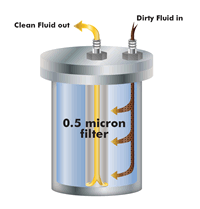Fuel Filtration: Keep Your Engine Running Well With
Modern diesel engines require clean fuel to perform reliably while meeting emission regulations. Contaminated fuel can result in …
 Modern diesel engines require clean fuel to perform reliably while meeting emission regulations. Contaminated fuel can result in excessive wear and abrasion, corrosion, and stuck injectors. Clean fuel is the result of good fuel handling practices and superior Fuel Filtration at the engine. On-board filters should be capable of delivering fuel at an ISO Code of 12/9/6 or cleaner, i.e., levels cleaner than required by the FDA (US Food and Drug Administration) for injectable drugs. Achieving this level of cleanliness under engine operating conditions is beyond the capabilities of traditional Fuel Filtration; therefore advanced fuel filtration technology is required.
Modern diesel engines require clean fuel to perform reliably while meeting emission regulations. Contaminated fuel can result in excessive wear and abrasion, corrosion, and stuck injectors. Clean fuel is the result of good fuel handling practices and superior Fuel Filtration at the engine. On-board filters should be capable of delivering fuel at an ISO Code of 12/9/6 or cleaner, i.e., levels cleaner than required by the FDA (US Food and Drug Administration) for injectable drugs. Achieving this level of cleanliness under engine operating conditions is beyond the capabilities of traditional Fuel Filtration; therefore advanced fuel filtration technology is required.
Advanced Fuel Filtration provide a high degree of removal for particles 4 µm(c) and smaller, even under conditions of changing flow rate and vibration, as are typical for operating engines. At these levels of removal, it is no longer practical to express removal results in terms of efficiencies. A seemingly minor difference in efficiency, e.g., 99.0 versus 99.5%, means twice the contaminant going to fuel injection components and a correspondingly shortened life for them. For this reason, particle removal for advanced fuel filters is expressed in terms of filtration or ratios, as in the hydraulics industry. Filtration ratio is defined as the ratio of the number concentration of particles larger than a certain size upstream of the filter to its downstream concentration under defined test conditions. Thus, a filter that is 99.0% efficient has a filtration ratio of 100 while 99.5% corresponds to a filtration ratio of 200. Twice the filtration ratio corresponds to a twofold reduction in contaminant going to the fuel injectors.
What level of removal is required to protect modern diesel engines? The answer depends on the application. For less demanding, light duty applications where the fuel meets specification and proper fuel handling practices are used, filtration ratios as low as 64 may be adequate at 4 µm(c). For more severe duty applications where the fuel doesn’t meet specification and fuel handling practices are poor, filtration ratios well in excess of 200 at 4 µm(c) are required. These levels of removal are required under engine operating conditions for the full filter service interval, not just during steady-state laboratory filter tests.
Special System solution for oil / maritime / mining / transport / and production industry
 We produce ULTRA FINE FILTER (o,5 micron) for cleaning oil and diesel from water and particles.
We produce ULTRA FINE FILTER (o,5 micron) for cleaning oil and diesel from water and particles.
The filters can be used in bio diesel, engine oil, gear oil, hydraulic oil, bio oil, compressor oil and more.
See the main benefits:
|
|
Micfil products will save you Money, save you Oil, save you Fuel, extends the lifespan of your equipment and protects the environment.